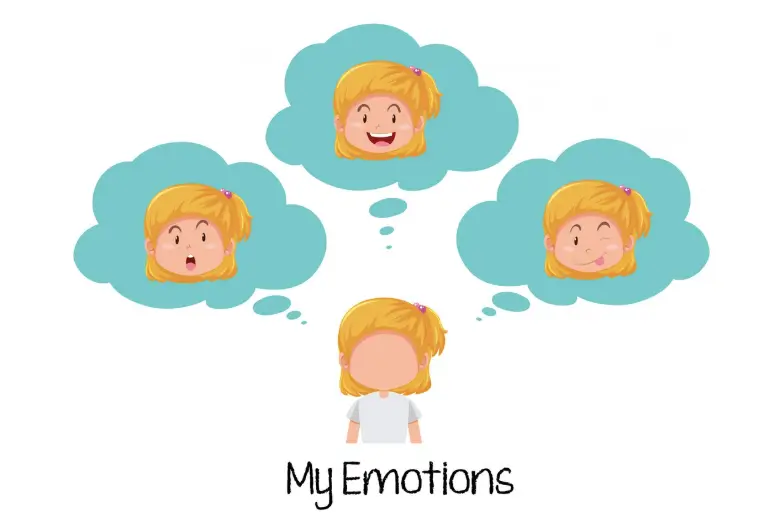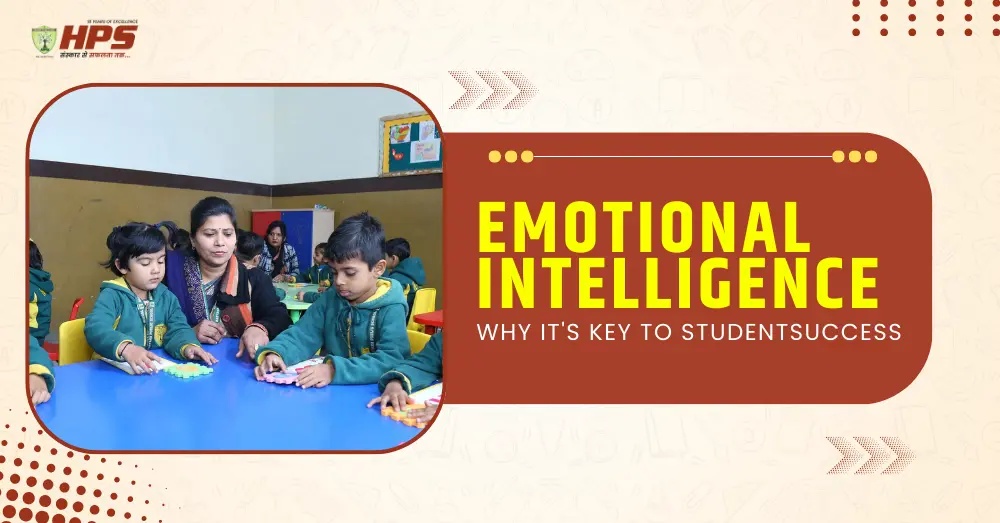Do you often measure your child’s success only through good grades and strong English skills? Parents often do that, but you should always remember the fact that academics build knowledge, while emotional intelligence builds character.
Your child may be good at academics and fluent in English, but can your child name and express their emotions?
Can they manage stress, show empathy, and ask for help when needed?
However academics are important, but today’s fast-paced world demands much more. Children need to be emotionally strong to handle challenges. And when we talk about Emotional Quotient (EQ), it’s not the same as Intelligence Quotient (IQ). In fact, EQ and IQ are very different, and both play unique roles in a child’s growth.
Recent research published in the American Journal of Pharmaceutical Education has shown that emotional intelligence is a proven predictor of better grades, higher engagement, and overall academic success. Therefore, as a parent, you must ensure that your child builds the skills that will truly prepare them for real-life challenges.
In this blog, you’ll understand what Emotional Intelligence in school is, why it’s important and how it enhances mental health and resilience.

What is Emotional Intelligence?
The ability to identify, understand, and acknowledge your emotions is called Emotional Intelligence. It is as important as any kind of Intelligence; emotional intelligence consists of various components like being self-aware, self-regulatory, empathetic, and more. These components are important for the emotional as well as mental well-being of your child.
Let’s understand the various components of Emotional Intelligence:
- Self-Awareness: Understanding Your Emotions
The ability to know what emotions one is experiencing and realize how these emotions affect behavior and thoughts refers to being emotionally intelligent.
- Self-Regulation: Managing Impulsiveness
The power of managing emotions, like staying calm under stress, thinking before giving any reactions, or dealing with negative people or thoughts, is a sign of self-regulation and emotional intelligence.
- Motivation: Staying Focused
Emotionally intelligent people use their inner motivation to stay focused in difficult situations. It is necessary to maintain a positive attitude even while facing challenges.
- Empathy: Connecting with Others
Being empathetic towards others is another important aspect of being emotionally intelligent. Before judging others, you try to understand their point of view.
- Social Skills: Building Meaningful Relationships
One of the most essential skills is being comfortable socially around people. This includes the ability to build healthy relationships, have good conversations, and resolve conflicts.
- Mental Health and Resilience: Facing Challenges
Prioritizing mental well-being and giving yourself enough time to relax makes a person emotionally balanced even during difficult phases of life. From here, they develop qualities of learning from mistakes and bouncing back on track.
The Role of Emotional Intelligence in Academic Success
Most parents often assume that only the Intelligence Quotient (IQ) helps their child to obtain good marks and become academically rich. And when that doesn’t happen, they push their child into more coaching classes and institutes.
But what often gets overlooked is that success isn’t driven by IQ alone. Studies show that students with higher emotional quotient are way better at managing difficult subjects, exam pressure, and feedback.
Here’s a closer look at how emotional intelligence plays a crucial role in your child’s academic success.
- Better focus: Students with good focus cannot be distracted; they don’t give attention to materialistic things or the outside world while studying.
- Stronger motivation: If your child is sufficiently motivated to perform well in school, then they will also ensure to study hard for tests or exams.
- Effective problem-solving: If your child is emotionally intelligent, then their problem-solving ability will work wonders in managing stress and anxiety.
- Healthy teacher-student relationships: Respect and empathy build trust. Hence, providing better communication leads to healthier relationships with friends, family, and teachers.
Long-Term Benefits of Emotional Intelligence for Students
Developing emotional intelligence at an early age not only helps your child in school but also creates a strong foundation for long-term success. Let’s understand the long-term benefits of emotional intelligence for students.
- Career Growth:
Emotional Intelligence helps students grow their careers in the right direction, as EI helps them gain beneficial values like teamwork, leadership, and communication.
- Healthy Relationships:
Lifelong friendships and relationships are only maintained when there is good emotional intelligence. In fact, these students even enable lifelong professional relationships.
- Decision Making:
Students with good emotional intelligence are great decision makers. Balanced emotions help them make confident emotions in both personal and professional life.
- Leadership Qualities:
Emotionally intelligent qualities like empathy and self control help students to become great and effective leaders.
- Overall Happiness:
Students with emotional awareness grow into adults who handle challenges calmly and maintain a positive outlook towards life.
How Schools Like HPS Foster Emotional Intelligence
Schools can develop emotional intelligence by providing a positive and creative culture. They prepare them through curriculum design, daily routines, and targeted activities.
A child spends most of his productive time in school; that’s why it is important to enroll them in a school that acknowledges and instills such values.
At Haryana Public School, we ensure that our students are academically as well as emotionally rich. We encourage classroom activities, group discussions, mindful programs, and various extracurricular activities, helping them grow outside of classrooms.
If you are looking for a CBSE school in Narnaul, Haryana, that helps your child to build emotional intelligence, then Haryana Public School is the ideal choice for your child’s bright future.
For more information, visit https://www.hpsnarnaul.co.in/
FAQ
What is Emotional Intelligence?
Emotional Intelligence is the ability to identify, understand and manage your emotions.
How does emotional intelligence impact academic performance?
Emotional intelligence makes students independent, and they can easily manage time, emotions, and stay motivated.
Can students improve their emotional intelligence?
Yes, students can improve their emotional intelligence through group activities, discussions, mindful and outdoor sports activities.
What role does emotional intelligence play in student relationships?
Emotional intelligence plays a very important role in student relationships, they teach them to understand other’s feelings, resolve conflicts, and communicate respectfully.
How does emotional intelligence help students manage stress and anxiety?
Emotional Intelligence makes students recognize early signs of stress and anxiety. This helps them to apply healthy coping mechanisms, hence, they don’t make impulsive decisions.

